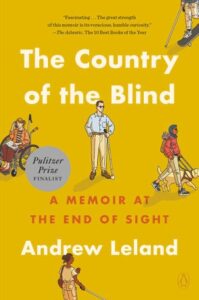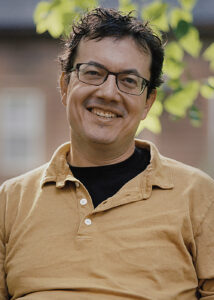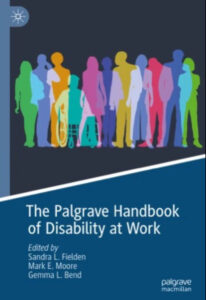
October is National Disability Employment Awareness Month, or “NDEAM,” celebrating the value, talent and contributions workers with disabilities bring to America’s workplaces and economy. NDEAM’s purpose is to educate the public about issues surrounding disability and employment, ensuring disabled workers have continual access to good jobs. Rutgers University-New Brunswick also celebrates of Disability Awareness Month with events throughout October highlighting diversity and disabilities, hosted by the Office of Disability Services.
This year’s official theme is: “Access to Good Jobs for All.” Books We Read is publishing a series of blog posts throughout the month to help promote and honor this initiative, including books highlighting disability-related topics and books by authors with disabilities, including Pulitzer finalist The Country of the Blind: A Memoir at the End of Sight by Andrew Leland, featured in this first post.
***
There is an unfortunate stigma that continues to exist around blindness even though blind people are a vital part of society, with careers as writers, actors, engineers, artists and more. In fact, blindness has appeared at or near the top of the list of “most-feared disabilities” in polls or surveys for decades. Writer Andrew Leland (The New York Times, The New Yorker) relays this fact and many more in his debut book, The Country of the Blind: A Memoir at the End of Sight.
Using eloquent prose, Leland vividly details his experiences with retinitis pigmentosa (RP), a genetic disorder that has slowly caused his vision to deteriorate and will eventually result in total blindness. I had the honor of reviewing this book AND interviewing the author for BookPage (a recommendation guide for readers, highlighting the best new books across all genres). Through this interview I learned that researching, writing about and experiencing the realities, both physical and emotional, of RP was “powerfully, unmistakably therapeutic” for Leland. As he explained, he “began the book awash in a sea of misconceptions, generalizations, assumptions and confusions; what an immense gift it was to be given the opportunity to spend three years rigorously interrogating, investigating, elucidating and defusing them!”
Because Leland still has some sight, he is able to “perceive everything with a paradoxical double vision: through sighted eyes, and through blind ones.” As a result, his current situation is that of transition: although not yet blind, he is experiencing enough visual impairment to understand what a future without sight will look like. His book is a thought-provoking and contemplative memoir, exploring how the conversion from sighted to blind is affecting Leland’s life, his view of himself and his relationships.

The author: Andrew Leland
Providing a raw and honest depiction of what it is like to straddle two worlds, Leland lays his feelings and the realities of his condition on the table, particularly the impact on his personal interactions. Along the way he chronicles the backstory of how he discovered he had RP, the genetic aspects of the disease and a general history of blindness. Other chapters focus on topics such as sight-assisted gadgets for blind people (both low and high tech), national organizations for the blind (and how they do not always share the same philosophies), blind activists (including folks from the Physically Disabled Students’ Program at UC Berkeley) and medical therapies for blindness (including CRISPR, gene therapy and wearable technology).
Diving deep into the history, politics and rich culture of blindness, Leland interviews a myriad of people with varying levels of blindness to get differing perspectives, interspersing their feedback with statistics and expert commentary. You would think The Country of the Blind would leave the reader with a sense of sadness, but the feeling is quite the opposite. By maintaining a level of wittiness mixed with reality checks, Leland’s prose exudes hope and authenticity. As he movingly writes, “as I lose my vision, I want to cultivate this picture of blindness – in Oscar [his son], and Lily [his wife], in myself, and in the world – of a blind person who’s an active protagonist in his own life.”
As a final epilogue, I wanted to share that the review and interview I did for BookPage was impactful enough that it prompted a reader to reach out to the publication’s subscriptions manager. Here’s what they said:
“Wow! I just got a phone call from a reader who called to thank us for our coverage of THE COUNTRY OF THE BLIND by Andrew Leland in the August ’23 issue (pages 22-23). Her adult son has the same retinal disease as the author, and she was floored when a friend showed her our interview in print. She immediately ordered the book and has been sharing it with others. She praised the tone of the interview, and appreciated the perspective put forth that blindness doesn’t have to be a tragic diagnosis. It was really special to hear from someone who was so emphatically touched by something she read in BookPage.”
What a wonderful feeling to know this inspiring book (named one of the best books of the year by: The New Yorker, The Washington Post, The Atlantic, NPR, Publishers Weekly and Lithub) has touched the life of others and is helping to spread awareness of blindness and other disabilities.
Disability Awareness Month Events
- Neurodiversity on Campus: Perspectives from Black/Brown students navigating the academic and social-emotional challenges of college, October 8th, 12:30pm – 1:45pm, Alexander Library Teleconference Lecture Hall (will not be streamed due to sensitivity of topic)
- Empowering People: Disability Rights, Power, and Lived Experience, October 8th, 2:30pm – 4:00pm, Alexander Library Teleconference Lecture Hall (and via Zoom)
- Empowering Lives: The Role of Service Dogs in Creating Independence for People with Disabilities, October 15th, 10:30am – 12:00pm, Alexander Library Teleconference Lecture Hall (and via Zoom)
- Guiding Independence: Understanding the Role of Seeing Eye Dogs, October 15th, 12:00pm – 1:30pm, Alexander Library Teleconference Lecture Hall (and via Zoom)
Additional Rutgers Library resources
LibGuides
- Disabilities and Employment – intended to introduce students and researchers to the resources located within the Rutgers University Libraries system on disabilities and employment.
- Human Resource and Organizational Management (Disabilities Web Resources Tab) – links to disabilities-related web resources.
- Dance (Disability and Movement Resources Tab) – links to books and articles that highlight dance techniques and resources for disabilities
- Occupational Therapy – a starting point for students and faculty to learn about various resources in the field of Occupation Therapy
- Workers’ Compensation Resources & Research – links to scholarly and workers’ resources related to Workers’ Compensation.
- Being Heumann: An Unrepentant Memoir of a Disability Rights Activist, by Judith Heumann – the inspiring story chronicling a woman’s fight for educational access as a young person, laying the foundation of the Americans with Disabilities Act as an activist and ultimately working in Washington to establish disability rights as human rights.
- Disability and Equity at Work, by Jody Heymann, Michael Ashley Stein and Gonzalo Moreno – discusses how to improve the employment situation of persons with disabilities around the world.
- Disability Practice: Safeguarding Quality Service Delivery – critically engages with the social, political and ethical implications of support for people with disability to be fully included in society.
- The Palgrave Handbook of Disability at Work – a handbook covering all aspects of people with disabilities entering the workplace, including the legal aspects, transitions, types, and levels of employments, the impact of different disabilities, and the consideration of the intersection of disability with other identities such as gender and ethnicity.
- You don’t look sick!: living well with invisible chronic illness, by Joy H. Selak and Steven S. Overman, MD – chronicles a patient’s true-life stories and her physician’s compassionate commentary as they take a journey through the four stages of chronic illness – Getting Sick, Being Sick, Grief and Acceptance and Living Well.
